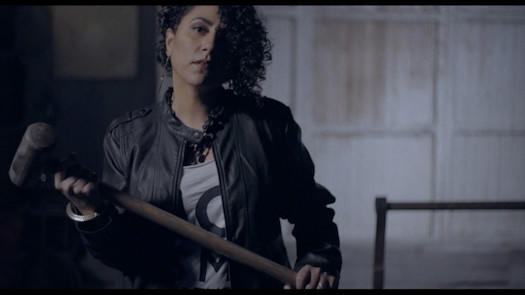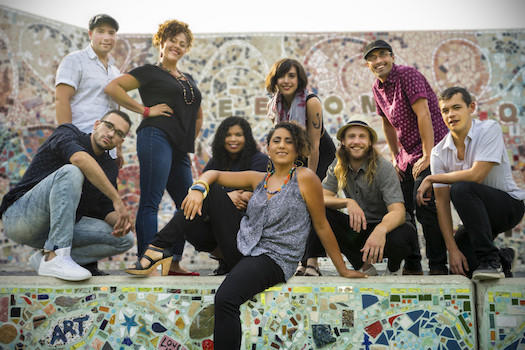Everything changes: Taína Asili

Artist Taína Asili
Everyone has a moment in life when things change. Sometimes we know it right away, other times we only recognize it looking back. With the turning of the year, we're taking some time to listen to people's stories about the moments that changed them, and what they've learned.
Taína Asili's work is hard to define. The internationally-known Puerto Rican singer, songwriter, documentary producer, bandleader, artist, and activist, who calls the Capital Region home, acknowledges that her work is unique. Influenced by Latin music, nueva canción, Afro-Latin, opera punk, flamenco, and rock n' roll, much of her music and art is connected to social justice issues and connects to the musical and artistic traditions of her ancestors.
From her earliest days, Asili says, there was never a time when she didn't identify as being a singer or an artist. But when you're forging your own path, when your style can't be easily defined, can be an incredible hurdle in a business that wants to package your work for sale.
In college, and for a few years after, Taina was part of a punk band, releasing albums and touring the world. But she felt like her voice had more to say than the punk genre would allow.
When her parents died -- and she herself was a single mom -- Asili says she went through a period where she felt lost. She traveled to Mexico where a trip to a town she never planned to visit set her back on her own unique path.
I have a woman that used to take care of me when I was a baby and she used to say, "Oh, she's going to be an opera singer," because I would scream so loudly. I was a colicky baby and I would just scream these operatic screams. Everyone told me that I was a singer and I always felt that I was. And it wasn't a far stretch because my dad was a singer and my sister sang and my mom was a dancer. I grew up in an artistic household where that was a part of our collective identity.
I grew up outside of Binghamton in a small suburban town in this Puerto Rican household in a community that was predominantly Italian and Polish and I could probably count on my hand the amount of kids of color that went to my school. And I had this particular kind of artistry that was connected to my ancestry and that was a reminder of the fact that not only did art not begin or end in this time period but that we've had art passed down from generation to generation as long as we've existed as a people.
The artform that my parents practice was this folkloric artform called Bomba, which comes from our African and Taino ancestors. And it's this combination of dancing, singing, drumming and it was used during the time in Puerto Rico when the African people -- the Taino people -- were enslaved. It was used as a way to reclaim our humanity. It was a way to continue to practice our cultural and spiritual practices. It was important time. Like when the slave masters would go away to church they'd be organizing slave revolts, they would be organizing and communicating with one another.
There's another sister artform to that called plena, which would carry news from town to town through the music and so that art form has been passed on from generation to generation to generation to generation lasting to today.
So that was the artform that my parents practiced. One of many. And so it was a reminder that, what I always knew, that what I was doing was a part of something deep and magical and beautiful in that way.

photo by Kiki Vassilakis
But I also am a musician in a whole wide range of types of music. And I studied flamenco and I lived in Spain for a little while and that's a huge part of my musical heart, my art. I love Latin American folkloric music from an era that's called nueva canción or nueva trova. It was an era of Latin American folkloric music most most popular in Chile or in Cuba that was known for writing songs about liberation. I studied with an amazing woman who was an opera singer. I even worked with a punk band for a while. There wasn't a huge hustle to what we did in the punk band. It just kind of organically happened. I mean, of course, we worked. We recorded and we practiced and we did all the things. But there was already a scene that was waiting for that.
The carving my own path, I think, really took place when I left that scene because I didn't want to sing punk rock because I feel like my voice had more to say than that genre of music and that world could hold. I wanted to make music that was authentic to me in a really true sense. So I wanted to bring in my parents' cultural background and that history and I wanted to bring in the punk rock. I wanted that rebellious spirit. I wanted to bring in the vocal training and all these different things that have made me who I am. And that was, and is, still really hard because the world likes to keep things in nice, neat boxes -- especially industries and capitalism. You want to keep it a nice-and-neat, sellable box.
When I left the punk band I had this time period of my life where my parents died and where I became a single parent and I was feeling very lost in terms of where my next step was going to be. And around that time I went to Mexico to a town called Cuernavaca. And there I was invited to a musicians' party. And I didn't feel like I was a good enough musician to go to this party -- because these were, like, world class musicians from all over the world: Mexico, Chile, Japan, Colombia. All over the world. I mean -- flute players and a pianist and percussionists and every different type of instrument -- it was amazing.
And I walked into this space, into this party, and Gaetano -- my partner now -- is with me. And we walk into this party and I was just so inspired that they were just creating. And it wasn't any particular type of music -- they were just letting their musical voices just vibrate, just speak, just blend in all these improvisational and beautiful ways. And I was like "Wow!" And I got caught by the bug of that moment and I started to sing.
The woman whose house it was -- she was a singer as well -- she turned to me and she was like, "You need to do this! You need to sing professionally." And I was like, I know, I know... you know, but... And she's like "No. You have the gift. You need to do this."
And I walked out of that party with this new sense of possibility and this new courage to carve my own path.
I found out later on in that trip -- I had called an aunt to find out where my parents had lived when they lived in Mexico, because they lived in Mexico for a while -- and it turns out the town was Cuernavaca, where I was; and where I wasn't supposed to be.
It was totally coincidental that I happened to show up there. And I really believe that they guided me there. That day, that party, that experience, changed everything for me.
... said KGB about Drawing: What's something that brought you joy this year?